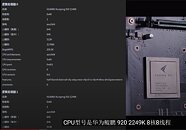Monday, July 6th 2020
Huawei Desktop PC with Kunpeng 920 Processor Teased and Tested
Huawei has been readying the entire new breed of desktop PCs with a custom motherboard, custom processor, and even a custom operating system. Being that Huawei plans to supply Chinese government institutions with these PCs, it is logical to break away from US-made technology due to security reasons. And now, thanks to the YouTube channel called "二斤自制" we have the first look at the new PC system. Powered by Huawei D920S10 desktop motherboard equipped with Kunpeng 920 7 nm Arm v8 processor with 8 cores, the PC was running the 64-bit UOS operating system, which is a Chinese modification of Linux. In the test, the PC was assembled by a third-party provider and it featured 16 GB of 2666 MHz DDR4 memory and 256 GB SSD.
The YouTube channel put it to test and in the Blender BMW render test, it has finished in 11 minutes and 47 seconds, which is quite slow. The system reportedly managed to stream 4K content well but has struggled with local playback thanks to poor encoding. Being that it runs a custom OS with a custom processor, app selection is quite narrow. The app store for the PC is accessible only if you pay an extra 800 Yuan (~$115), while the mentioned system will set you back 7,500 Yuan (~$1,060). At the heart of this system is eight-core, eight threaded Kunpeng 920 2249K processor. It features a clock speed of 2.6 GHz, has 128K of L1 cache (64K instruction cache and 64K data cache), 512K of L2, and 32 MB of L3 cache.
Source:
Tom's Hardware
The YouTube channel put it to test and in the Blender BMW render test, it has finished in 11 minutes and 47 seconds, which is quite slow. The system reportedly managed to stream 4K content well but has struggled with local playback thanks to poor encoding. Being that it runs a custom OS with a custom processor, app selection is quite narrow. The app store for the PC is accessible only if you pay an extra 800 Yuan (~$115), while the mentioned system will set you back 7,500 Yuan (~$1,060). At the heart of this system is eight-core, eight threaded Kunpeng 920 2249K processor. It features a clock speed of 2.6 GHz, has 128K of L1 cache (64K instruction cache and 64K data cache), 512K of L2, and 32 MB of L3 cache.



70 Comments on Huawei Desktop PC with Kunpeng 920 Processor Teased and Tested
but a (short) matter of time before there are waaay more considering how fast they are moving with that.
and obviously a processor or motherboard is a much easier thing to export then cars.
China are closing in on 1.5 billion people [USA+EU together only have half the population of China] so it is a massive market, when they catch up in CPU tech they will be a force to recon with for real.
It is easy to dismiss China today BUT with their resent insane investments in memory, nand, cpu and ai we will start to feel the ripples of Chinese tech out in the world by 2025 and by 2030 they will be one of the dominating forces in the world market.
Note that Chinese investment in these areas have been very low in the past BUT now with Trump screwing with the Chinese these past couple of years the Chinese have realized that they cannot be reliant on US tech and increased their investments a thousand fold to make them self's independent as soon as possible.
What Trump's ego did was to wake the sleeping dragon and now there is no way to put it back to sleep.
Arguably, 2019 was an outstanding year for ASML. After two decades of development, EUV-made chips finally started powering electronic devices. The first full-fledged EUV scanners were shipped and EUV bookings now constitute half of ASML’s order book (in terms of dollars). The company grew 8 percent, despite the semiconductor equipment industry as a whole registering an overall decline of 10 percent. And net sales – yet again – set a record.
None of this seemed of particular interest to the journalists who attended the annual results press conference on Wednesday. They made the trip to Veldhoven for one reason and one reason only: the US-Chinese power play over ASML’s EUV technology. With both the US and Chinese ambassador to the Netherlands weighing in, the issue has been dominating the news recently.
CEO Peter Wennink was a good sport about it, though. None of the press material issued in advance mentioned the awkward circumstance the company finds itself in, and Wennink didn’t say anything about it during his presentation. But once the floor was opened to questions and the elephant in the room was addressed, he presented his arguments on why the issue doesn’t impact his company all that much – despite the involvement of two superpowers.
“EUV is a driver of so many technologies that we can be sure there will be demand for the chips around the world. If for whatever reason we’re not allowed to sell EUV systems to China, another company will jump in to satisfy the demand. We’ll just ship to that company. It doesn’t matter to us where the chips are manufactured,” Wennink explained. In other words, ASML doesn’t expect to lose a single order. “Financially, the impact is zero.”
Geopolitical arena
Wennink stressed that the risk of the Chinese using an EUV system to steal the technology is nil. “We’re the only company in the world capable of making these systems. What do you think would happen if we catch them trying to copy it?” Wennink countered. The scanners themselves are well-protected, he assured, with ASML crews surrounding it 24/7 and sensors alerting Veldhoven even if someone removes a panel.
Should the Chinese want to give it a try anyway: good luck to them. Wennink cited the (in high tech well-known) story of a Chinese university that took apart an ASML scanner years ago, copied every single part to assemble a new machine, yet never succeeded in getting it to work. “We’re a systems integrator in a collaborative knowledge network. Our knowledge is in the minds of people, not in patents.”
So indeed, should the Dutch government OK the export license to China, ASML will be more than happy to ship the scanner. And if it shouldn’t, that’s fine too. In essence, Wennink tried to divert the spotlight away from his company and towards the geopolitical arena. Let governments worry about it, we have work to do.
bits-chips.nl/artikel/asml-if-we-cant-ship-it-to-china-well-ship-it-somewhere-else/
Ya know i am going say no more.A blessing in disguise.
So, probably not really representative of some upcoming modern desktop ARM chip.
nationalisticrevolutionary movement towards homegrown solutions will not bear much fruit for the masses. Basically when there's money to be made on both sides, by elites & corporations, it doesn't matter (to them) whether they're selling you an Intel chip or a Chinese clone!Fortunately, Apple will do much better design, engineering and optimizations than these, but where this will lead is anyone's guess :)
China has what's known as the 3-5-2 program, which means that by 2021, they want 80% off all locally used computers, to be made from parts that have been produced in China, by Chinese companies.
However, I doubt China will be dominating anything outside of China, too many countries are suspicious of Chinese tech. If there are no buyers, how could they dominate anything?
They already have a ton of Chinese made CPUs, most of them have never seen the light outside Chinese government agencies.
en.wikipedia.org/wiki/Science_and_technology_in_China#Microprocessors
Wouldn't be surprised if you started seeing them popping out in smaller EU markets in a few years.
And by the way, you might just be looking at your own geography.
Chinese cars are indeed slowly making its waves outside of China.
Just check at the Geely Coolray and the value you are getting for less than twice or more compared to its competition. Had I not bought the Jimny for my wife, I could have gotten her the Coolray instead, only that time it was not yet available at my location. Of course, durability and reliability are another topic, but hey, had I bought it, I probably bought it for what it is and I won't expect anything more (or less).